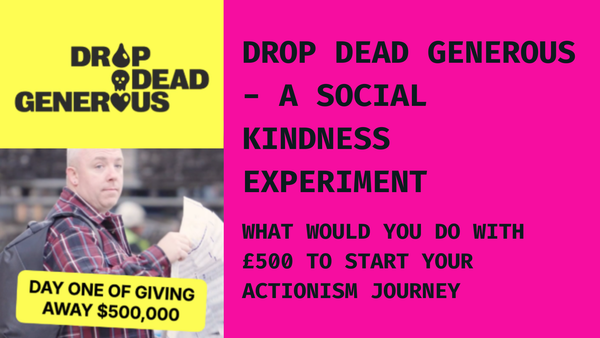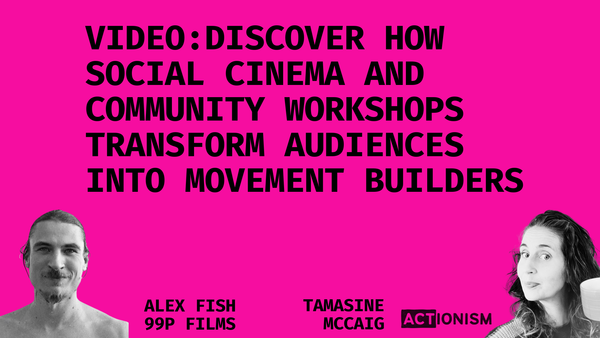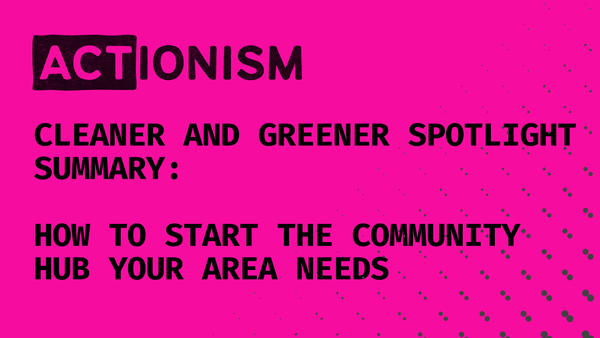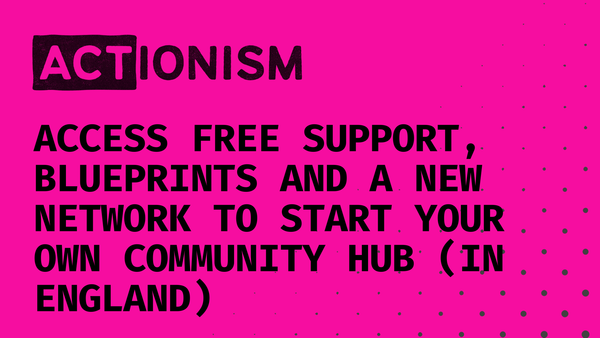WORSE THINGS HAPPEN AT SEA
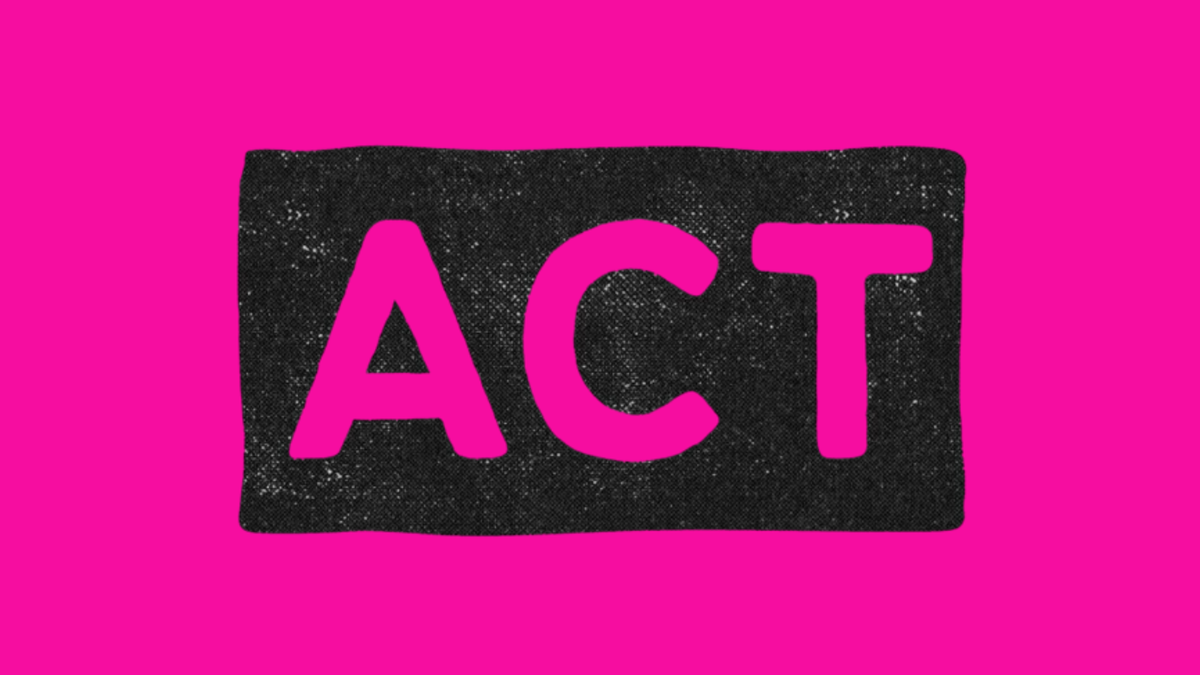
WHY I QUIT MY JOB TO SAVE THE WORLD
BY SIMON DONOVAN
They say "worse things happen at sea," but watching Seaspiracy on Netflix in the spring of 2021 made me realise just how dire the state of the fishing industry really was. Fishing clearly had critical sustainability issues, and if fish wasn’t a viable alternative to meat then I had to question continuing to eat either. Deciding to become vegetarian was the first of several course changes along my journey into sustainability.
Roll forward a year, and ESG (Environmental, Social, and Governance) considerations seemed to become an increasingly central focus for businesses. The company I worked for introduced the opportunity for employees to become "Sustainability Champions" alongside their existing roles and I jumped at the chance. While most of my work to date had been in digital technology and e-commerce, I had been heavily involved in systems that captured product data. I knew this was becoming increasingly relevant as businesses focused more on emissions reporting and I figured I had experience and insights that could help. Around the same time, I actively started to re-engineer my LinkedIn feed to start following top sustainability voices.
Heading into the storm
I’d had a copy of Doughnut Economics sitting on my shelf for a while, but I never got around to reading it then, on the journey home from holiday in the summer
of 2023, I listened to Kate Raworth talking about Donella Meadows (BBC) and her contribution to systems thinking and the book, Limits to Growth. That these concepts had been around since before I was born was enlightening and somewhat shocking at the same time..
Amongst the other unread books on my shelf, I finally got around to reading How the World Really Works by Vaclav Smil, which outlined the scale of the challenges we face from a resource and energy perspective. This was quickly followed by Cascades by Greg Satell, which presented the idea that what's needed to drive transformational change is the power of small groups that are loosely connected but united by a common purpose.
Shortly afterwards I attended my first People, Planet, Pint meet up in Leeds; It was a fantastic way to connect with like-minded people from the local region in real life. The early shoots of my future network sprung from that and future meet-ups.
Then towards the end of 2023, I picked up a recommendation for Jem Bendell's Breaking Together which introduced me to the concept of collapse awareness—the understanding that systemic breakdowns in our environment, economy, and society are not just possible but already underway. This shift in perspective and adopting a "when, not if" worldview threw already existing problems into much sharper focus.
Deciding to jump ship
As my awareness of the world’s wider problems continued to grow, progress on sustainability in my professional career seemed to be not just at a standstill but actually sliding backwards. It became increasingly apparent that the gap between what was needed and what was actually happening in the business was becoming a chasm. By February 2024, I came to the conclusion that every additional day in the office was another day not maximising the impact I felt I could be making elsewhere.
A three-month notice period later, I jumped with both feet into the world of self-employment. I left the corporate business world on good terms, but not without some honest critiques of the "sustainability by incrementalism" approaches being adopted.
After 30 years of full-time work, I had planned a short break—but there was too much to explore. The sheer number of opportunities and the urgency of the challenges I had been exploring made it impossible to sit back. When you have full control over your working hours and are focussed only on projects you truly care about, work can quickly take on a life of its own.
Navigating New Waters
In the nine months since I left the corporate world, I’ve explored almost every avenue that presented itself. Joining the Association of Sustainability Practitioners has been a fantastic gateway into the wider community, leading me to attend the Yorkshire Sustainability Festival, which provided even more sources of inspiration.
September saw me diving headlong into a three- month accelerator program for Sustainability as the World Needs, based on the excellent work of Alice Kalro and the team at ArkH3. Within an international cohort, we explored the radical transformations businesses need to undertake to become truly sustainable in light of the unfolding meta-crisis, along with strategies and tools to drive that change.
BUT WE DON’T HAVE TO FIND ALL THE ANSWERS OR FIX ALL THE PROBLEMS ON OUR OWN. A RECURRING THEME ACROSS THE COMMUNITIES AND NETWORKS I’VE JOINED OVER THE PAST YEAR IS THE VALUE OF SAFE SPACES —PLACES WHERE PEOPLE CAN OPENLY DISCUSS THEIR FEELINGS AND FEARS.
More recently, after finally finishing Citizens by Jon Alexander, I joined the Citizen Collective to see where my experience and skills could best support this growing movement.
Finding safe harbour and setting sail again
I guess no journey into the unknown is complete without some periods of doubt on the direction of travel. Despite telling myself to trust that the right path would become clear in time, I still struggled with uncertainty. But if I've taken one thing away from some of the bigger projects I've worked on previously it's that you can't jump to the solution without first taking a look at the wider context. The only problem with that was the more you explore these issues, the easier it is to become overwhelmed by the scale of the challenge. Anxiety over the future for the world can also compound any personal fears of failure.
But we don’t have to find all the answers or fix all the problems on our own. A recurring theme across the communities and networks I’ve joined over the past year is the value of safe spaces—places where people can openly discuss their feelings and fears. Through that support and the many conversations I’ve had, I’ve gone from a blank page titled “What can I do?” to defining three clear areas of personal focus where I believe I can help others:
- Supporting Individuals: Developing a holistic approach to help individuals assess where they are on their sustainability journey and signposting the most impactful actions they can take next.
- Transforming Businesses: Engaging with and supporting businesses to move beyond regulatory-led carbon accounting and Sustainability-as-Usual into adopting Sustainability as the World Needs (SWoN) principles
- Building Connections: Identifying and fostering active connections between individuals and networks to accelerate collective momentum toward the future we need rather than the future we are currently headed toward.
I now have a purpose and a roadmap for delivering on it, which includes actively working with individuals, businesses, and networks to drive meaningful change. By focusing on direct engagement, knowledge sharing, and strategic collaboration, I can help others take actionable steps towards sustainability and systemic transformation. In practical terms what does that look like? Well as one example I'm actively looking to make time for one-to-one chats with new connections where I can, sharing resources and exchanging insights. Building on each other’s existing efforts and experiences unlocks the door to more rapid and greater collective achievements.
2025 has got off to a strong start; this week I delivered my first-ever leadership strategy workshop for a local environmental non-profit. Next week, I have a call with a Chief Sustainability Officer to explore how I can help a company go beyond just meeting its ESG compliance obligations. Beyond that where the currents and tides of self employment take me remains to be seen but I do know that adventure and self fulfilment await.

